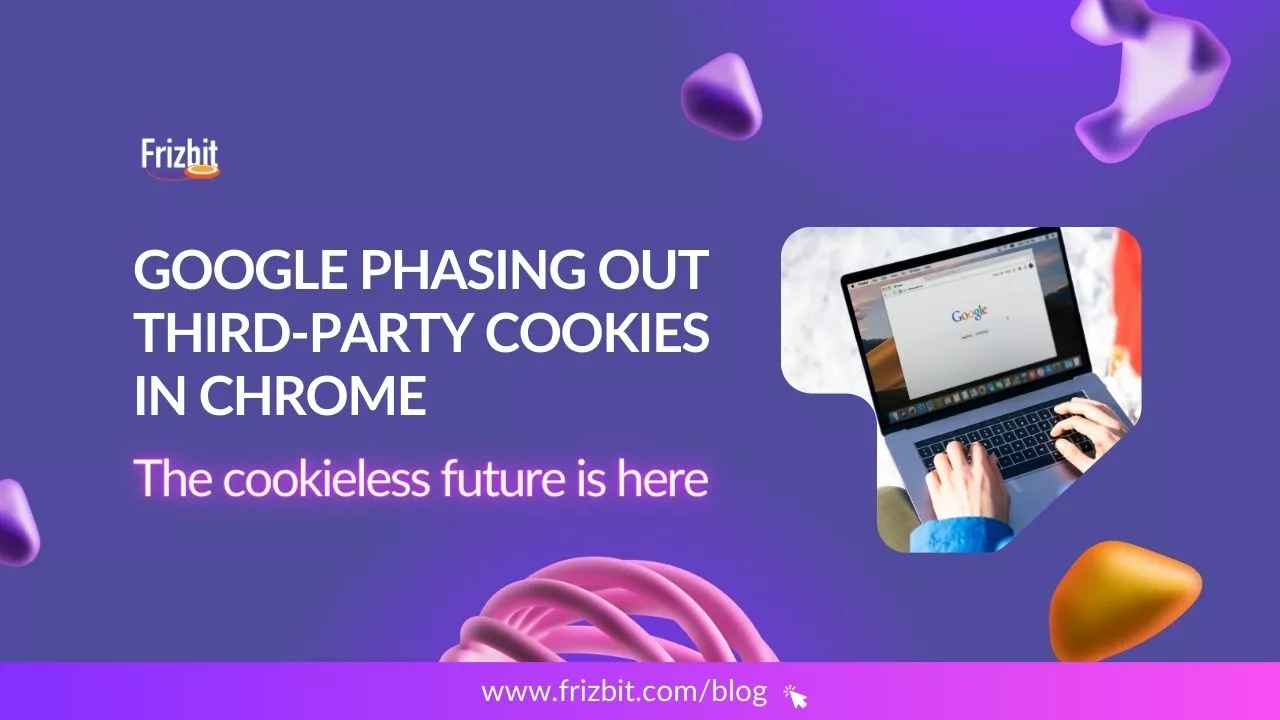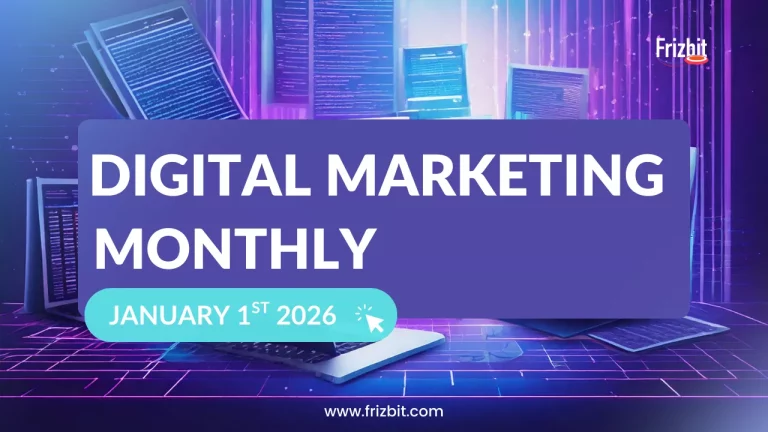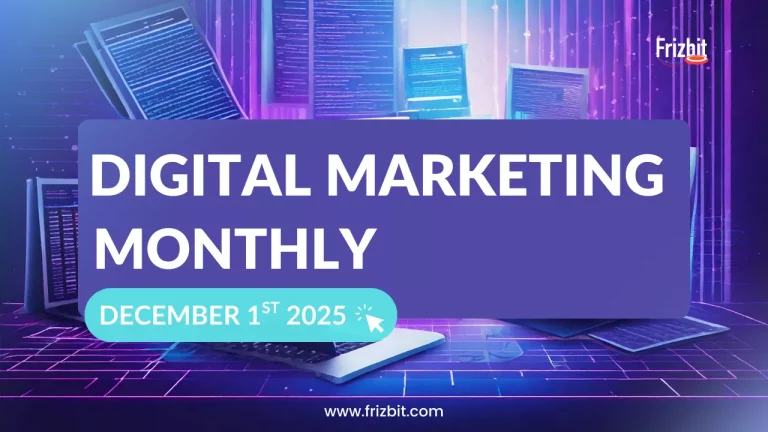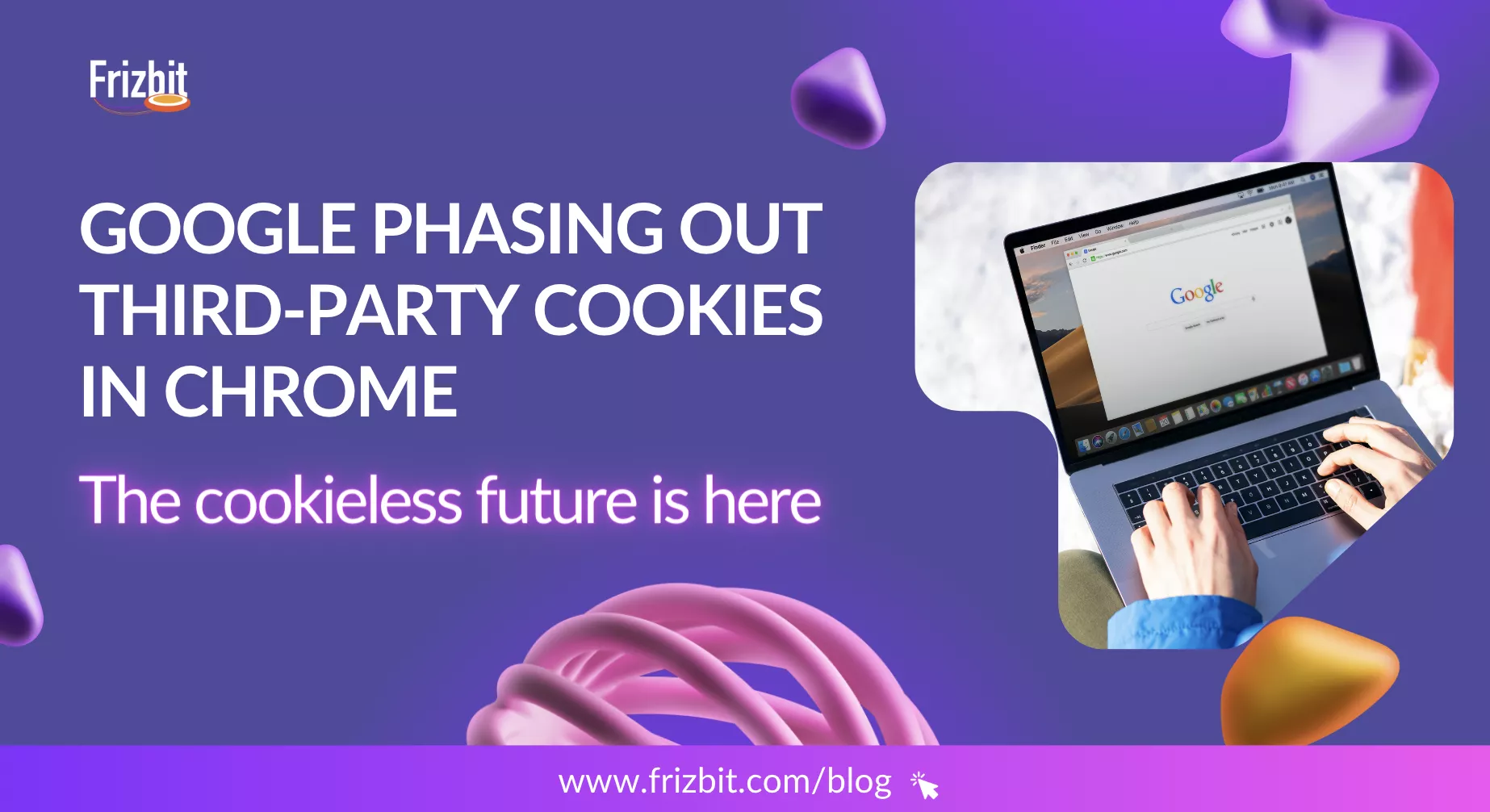
As of 2024, Google will phase out third-party cookies for Chrome users, although advertisers and publishers will still be required to obtain consent from users to collect and process their information.
Here’s what you need to know about Google Chrome’s end of third-party cookies, what technologies will replace them, why consent will remain an important factor and what other alternatives can you implement in your digital marketing strategy.
The Shift Away from Third-Party Cookies in 2024
Attention all Google Chrome users!
Google Chrome is setting a new standard in online privacy by phasing out third-party cookies. This significant change, affecting one of the most popular web browsers globally, marks a pivotal moment in digital browsing and privacy.
Starting January 4, 2024, Chrome initiated a phased approach, beginning with restricting third-party cookies for 1% of users, with plans to extend this to all users by the third quarter of 2024.
Chrome plans to gradually increase these restrictions, aiming to apply them to 100% of users by the third quarter of 2024. To navigate this transition, Chrome has increasingly relied on its Privacy Sandbox initiative.
The Path to a Privacy-Focused Web: How Chrome will phase out third-party cookies
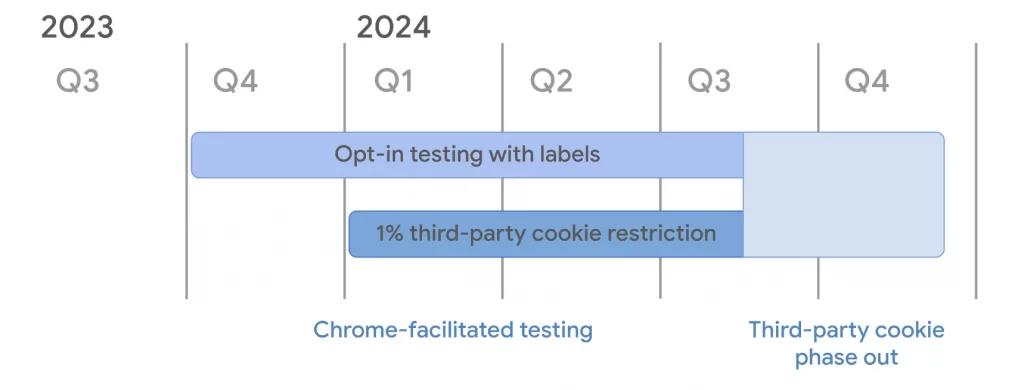
Source: Google Chrome
Google’s Privacy Sandbox seeks to minimise cross-site tracking while preserving the web’s open nature.
With milestones set for late 2023 and early 2024, the initiative introduces Chrome-facilitated testing for developers and businesses to adapt to these changes.
As a consequence, Consent Mode v2, launched on March 6, exemplifies Google’s commitment to enhancing privacy. It offers a compliance framework for the European Union’s GDPR, allowing businesses to adapt their data collection practices to respect user preferences.
The importance of Consent Mode V2 as solution for third-party cookies’ depreciation
“With changes such as the depreciating of 3rd party cookies, google consent mode v2, and various tracking methodologies that are being debated it is going to be a tricky landscape to navigate”
Siobhan Solberg, Data Privacy Consultant
Starting from March 6th, Consent Mode v2 will be introduced by Google as part of its efforts to enhance user privacy on websites. It provides website owners with a solution to comply with privacy regulations, such as the European Union’s General Data Protection Regulation (GDPR).
Some key aspects of Consent Mode v2 is its ability to help businesses recover valuable information, such as sales metrics or conversions, while respecting user privacy preferences. It achieves this by moderating data collection and processing based on the user’s consent choices.
Overall, Consent Mode v2 ensures a balance between user privacy and the needs of businesses to gather actionable insights.
Understanding the Role of Cookies
For many of us, cookies are something we barely notice while surfing the web.
However, these small pieces of data play a crucial role for advertisement companies and how they collect and track online customers’ interaction to build personalised advertisements and a more accurate browsing experience.
As they primarily serve advertisers and tracking companies, collecting information about your browsing habits to deliver targeted ads to enhance the online shopping experience, it’s only natural that the impact on eCommerce strategies will be significant.
This data collected in Google Chrome based on the browsing behaviour is valuable for marketing specialists because it helps them to understand users interests and needs when navigating certain websites. For years now in digital marketing, this was one of the most powerful decision-making tools to accurately attract their target audiences and create campaigns that would be more effective. Without having to spend a lot of money and time based on uncertain information.
It doesn’t sound too bad, so why did Google Chrome decided to phase out third-party cookies?
— It’s clear, privacy concerns
The widespread use of third-party cookies has raised concerns about online privacy, as users’ browsing activities are tracked and shared across various websites without their explicit consent.
— Action required: Other browsers already banned third-party cookies
Browsers such as Safari, already committed to user privacy and blocked third party cookies in 2017. Another competitor, Firefox, who promised their users’ privacy also entirely blocked them in 2019.
Google Chrome is getting closer to Q3 in the phasing-out plan
How would phasing out third-party affect eCommerce?
Understanding its utility for marketers and eCommerce specialists, here’s how the new approach would affect this sector:
- Personalisation: Without third-party cookies, eCommerce platforms may struggle to deliver the same level of personalised experience to users, potentially altering conversion rates and customer satisfaction.
- Retargeting: Third-party cookies are instrumental in remarketing efforts, without the ability to track users across the web, remarketing campaigns may become less effective, impacting revenue and customer retention strategies.
- Analytics: Third-party cookies provide valuable insights into user behaviour, site performance, and customer journey optimisation through analytics tracking. Losing access to this data could hinder eCommerce businesses’ ability to understand their audience, optimise their website, and make data-driven decisions.
- Advertising: Third-party cookies are widely used for targeted advertising, allowing eCommerce businesses to deliver relevant ads to potential customers. This will impact advertising revenue and ROI.
- Cross-site functionality: Third-party cookies support various cross-site functionalities such as social media sharing buttons, embedded content, and payment gateways. The absence of third-party cookies may disrupt a smooth and integrated shopping experience for users.
The transition away from third-party cookies will likely impose some challenges for eCommerce businesses.However, it also presents an opportunity for businesses to explore alternative strategies, such as first-party data collection, contextual advertising, and privacy-centric approaches.
How phasing out third-party cookies will impact customer experience
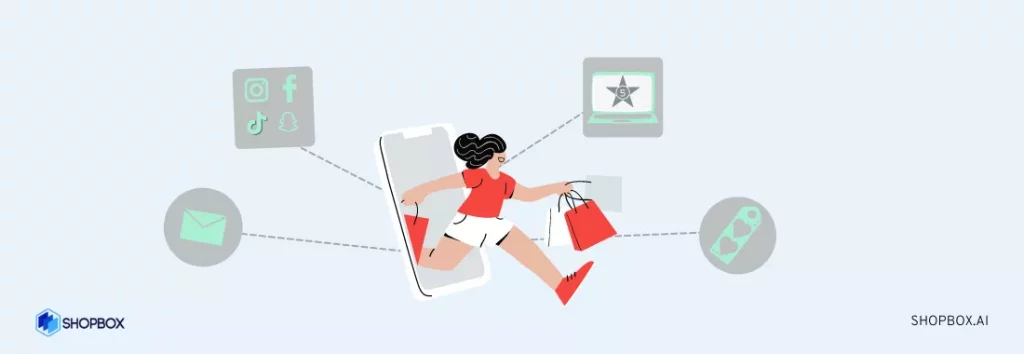
Source: SHOPBOX.AI
Cookies have been instrumental in enhancing the customer experience online, allowing businesses to deliver personalised content, recommendations, and advertisements tailored to individual preferences.
The blocking of third-party cookies could potentially disrupt the seamless customer experience users have come to expect, leading to a less personalised browsing experience.
Although it might create more generic online browsing experiences, we have to take into consideration that third-party cookies can be intrusive from a user perspective.
Third party cookies collect very specific information that can be highly personal, and many users feel being tracked too closely even feels “scary”.
Okay, we’ve talked about third-party cookies and their impact, so what other alternative do I have?
Third-party vs first-party cookies:
First-party cookies and third-party cookies are both small pieces of data stored on a user’s device by their web browser, but they serve different purposes and originate from different sources.
First-party cookies are created and managed by the website that the user is currently visiting. They are primarily used to enhance the user experience by remembering user preferences, login credentials, and items in a shopping cart.
On the other hand, third-party cookies are generated by domains other than the website the user is currently visiting. These cookies enable targeted advertising, behavioural retargeting, and audience segmentation by collecting data about a user’s browsing history, interests, and online behaviour.
First-party and third-party cookies main differences
| First-party cookies | Third-party cookies | |
| Where are the cookies used? | Only work on the website that made the code. | Accessible on any website that loads a third-party server’s code. |
| Who can access the cookie? | Only the original website can read them. | Anyone with the correct program can read them. |
| When can the cookie be read? | Only when the original user is actively on the original website can they be read. | Users can read them at any time. |
| What does my browser do with them? | Supported by all browsers. Browsers give users tools to reject cookies. | Once supported by all browsers. However, browsers are increasingly blocking them or providing ways around them. |
No more cookies? Third party cookies go, but First-party cookies stay
Consent based marketing is the way to go in a cookieless world.
If you want to stay on top of competition, you have to make sure to create warm leads, which means you only show ads to users who gave you explicit permission to do so.
These leads are interested in your brand messaging, which means a bigger probability of conversions in the marketing funnel and better results in your ROI.
Yet, in a world where traditional ad efficacy is increasingly questioned, it’s essential to explore beyond mere advertising.
What alternatives can businesses leverage to connect with their audience meaningfully?
Permission marketing channels engaging with consent are: web push notification, SMS and email marketing, chatbot marketing, etc.
Let’s dive into one by one.
How can Frizbit support you in the shift from traditional advertising to consent automated marketing solutions?
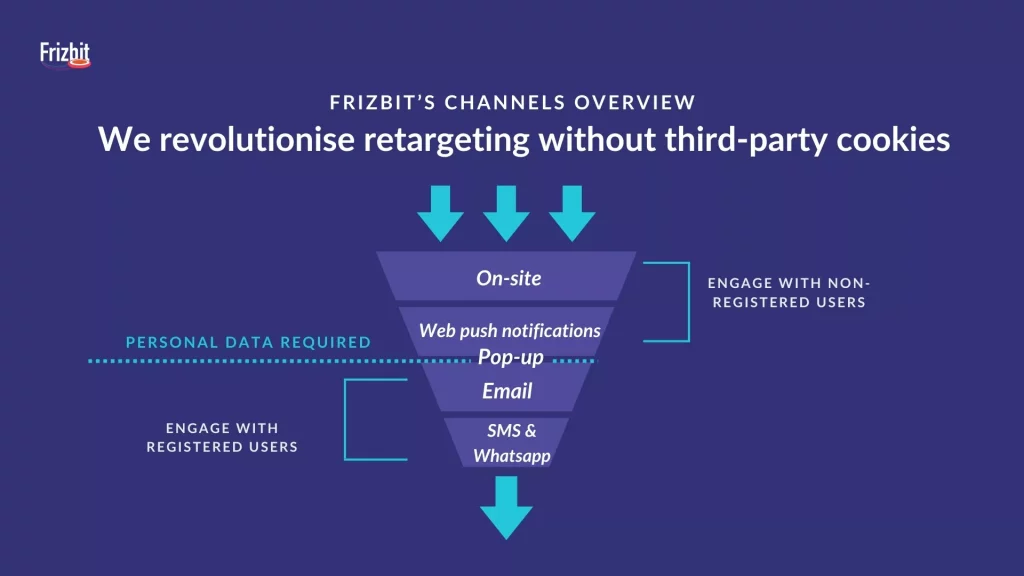
If we have a look at the graphic above, we can see the traditional sales funnel, however in this case, it’s showing different channels capabilities and their best usage in the purchasing journey.
Innovative channels like Web Push Notifications and AI-driven Product Recommendations demonstrate that personalisation doesn’t require personal data.
These tools offer highly tailored communications and product suggestions, catering to both registered and unregistered users alike. Their effectiveness in fostering user engagement and retention places them at the forefront of digital marketing strategies.
Conversely, some strategies leverage personal data to deepen relationships with existing customers.
Email marketing, SMS campaigns, and WhatsApp messaging utilise user information to deliver highly personalised content. These methods are integral for re-engaging registered users, maintaining their interest, and driving further conversions.
By understanding and applying the strengths of each channel within the sales funnel, marketers can craft a comprehensive strategy that respects user privacy while ensuring meaningful engagement and retention.
Channels that don’t require personal data
Web Push Notifications are messages users opt to receive from a website or web app. Applying this method, businesses achieve to engage with both registered and non-registered users, delivering hyper-personalised and behavioural messages without requiring any personal data from the users, thus ensuring GDPR compliance.
With an average opt-in rate of 2-10% and a CTR of 8.5%, web push notifications prove to be the most engaging user retention channel, offering higher retention rates compared to alternatives like social media.
AI product recommendation engine
Frizbit’s AI Product Recommendation Engine targets existing customers, tapping into their higher likelihood of trying new products and tendency to spend more.
By harnessing real-time behavioural and transactional data of online shoppers, Frizbit’s AI engine creates personalised product recommendations without relying on third-party cookies.
With proven results, including a notable 15% increase in sales and a 20% boost in average order value, Frizbit’s AI Product Recommendation Engine offers eCommerce businesses a scalable solution to amplify revenue and stay ahead of competition.
Channels that require personal data
As we delve deeper into our discussion, it’s crucial to address channels that necessitate the use of personal data.
It’s important to note that from Frizbit, as service providers, the ownership of this data does not belong to us.
This distinction is vital for ensuring our practices are in alignment with the General Data Protection Regulation (GDPR). Adhering to GDPR standards not only safeguards user privacy but also reinforces the trust between users and service providers by ensuring their data is handled responsibly and ethically.
Frizbit’s email marketing platform, uses features like smart segmentation based on recipient’s preferences and behaviours to create visually appealing and hyper-personalised emails that capture user attention effectively.
Additionally, it uses AI-led product recommendation capabilities to recover lost sales and boost purchase frequency by delivering relevant cart abandonment and product recommendation emails. With this approach, you can expect a 20% open rate and a 20% ROI.
Frizbit’s SMS marketing solution offers businesses the opportunity to engage with their audience through immediate and impactful communication.
These automated SMS messages are tailored to each recipient’s preferences and behaviours through smart filters and segmentation, such as users’ time zones.
Frizbit’s SMS marketing presents metrics like a 98% open rate and a 45% response rate, making it a powerful tool to engage with their audience and drive results.
Frizbit’s WhatsApp marketing automation solution offers businesses a powerful tool to engage with their audience through instant messaging.
These WhatsApp messages are based on user behaviour and bulk, segmented, and triggered campaigns, where businesses can maximise return and efficacy, generating high conversion rates and fostering loyalty.
WhatsApp Marketing from Frizbit shows impressive metrics like a 30% click-through rate and a 95% open rate.
Embracing the Cookieless Future: next steps
As Google Chrome and other leading browsers advance towards a cookieless environment, we’re witnessing a fundamental change.
For businesses, building customer loyalty and trust becomes even more critical in this new landscape. Eliminating third-party cookies offers a unique opportunity for eCommerce platforms to showcase their dedication to protecting user privacy and handling data responsibly.
However, this change is more than a compliance requirement; it’s an opportunity to enhance customer trust. By prioritising transparency, respecting user preferences, and adhering to ethical data practices, businesses can forge deeper connections with their audience.
This approach not only meets regulatory demands but also elevates the online shopping experience, building greater trust among consumers.
To thrive in this evolving environment, businesses must explore innovative strategies. Adopting first-party cookies as a cornerstone of digital marketing efforts allows companies to gather valuable insights directly from their audience.
This shift not only complies with privacy regulations but also ensures that businesses can continue offering personalised experiences, ultimately driving success in a cookieless world.
Need extra help?
If you’re looking to enhance or implement cross-channel strategies for a comprehensive 360º customer experience, including email marketing, web push notifications, SMS, and WhatsApp marketing, our team is here to guide you.
Enquire with our team today to request a free demo for 1 month and get a customised plan to cater your needs.
